Text
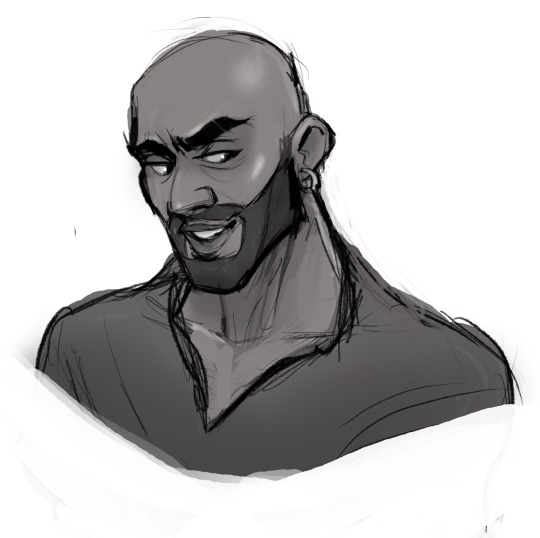
How have I never drawn Kingsley??? (And I’m sorry I keep giving beards to people who probably don’t have them lol)
188 notes
·
View notes
Note
Very important question: Based on his canonical age and class background, is Tom Riddle Sr. a Drones Club member?
My unhinged ship: Since Luna is extremely Madeline Basset-coded, and best shipped with older men, Luna/Grindlewald (the best analog I could think of for Roderick Spode, whom she marries in the TV adaptation).
(Whereas Neville is definitely Gussie Fink-Nottle-coded).
i cackled.
yes. tom sr. is one hundo a drones club member. the assembled members call him "croaker" - after the avian specimen in that famous riddle, "why is a raven like a writing desk?"
he and bertie wooster were clearly at eton together and had a minor rivalry which continued at oxford when tom [oriel] beat bertie [magdalen] to the lowest pass-mark in the year. bertie regards tom as a bit weak in the top storey, and is very much of the opinion that if he had a jeeves of his own he'd never have got into all that gaunt mess. he is correct in this assessment.
and i am unavoidably compelled to back the idea of gellert grindelwald/luna lovegood - and, all the more importantly, to back the idea of grindelwald as a secret entrepreneur in the realm of ladies' undergarments. the entire plot of the code of the woosters - with, i think, ron in the bertie "suspected of stealing a cow-creamer" wooster role and neville, as you say, in the gussie "my word, have you seen grindelwald eating asparagus?" fink-nottle role - would slap when transported to the harry potter universe.
i beg someone to write it.
13 notes
·
View notes
Note
What do you think about Bellatrix/Lupin?
thank you very much for the ask, anon!
and... flopping, i fear.
lupin's canonical vibe is really giving "massive self-loathing in the streets, humiliation kink in the sheets". this is unfortunate for bella, because while she's got a thing for men who are killing machines - and she thought lupin would be a suitable prospect on the grounds that he turns into a rampaging wolf once a month [ok, and? so do i, he's not special!] - she has no interest in brandishing the whip and telling remus he's a monster who should never be allowed to live in normal society and who should be paraded around on a lead in public so everyone knows what a mess he is. she's the one who wants to be on her knees with her hands tied behind her back getting a thorough telling-off for being foolish enough to get sent to azkaban - but remus can't quite project the authority she's looking for in a dom.
and he refuses to put in the red contacts.
6 notes
·
View notes
Note
So I found your blog a while back and I last night I finally found the time to browse through pretty much all your HP meta and ship takes (i slept way later than I should've yesterday, thanks to you ^^) and I'm astonished at how you manage to weave in well founded analysis even into your answers to even the most deranged ship-asks
That being said, I scrolled through a lot of your blog and I couldn't find your opinion on grindeldore as a ship. Since i really like your takes on ol dumbles (even though I don't agree with all of them. For example I don't think his whimsical traits are entirely a lie. I think they are a part of him he over-exaggerates as a coping mechanism and a comfort to himself and others) I was wondering how you think this relationship-dynamic worked, how it shaped him and how large a role it played in his later life
(This is not a reaction to the ask game obviously, since the ship has no gone rather mainstream. I sometimes miss its days of obscurity before the fb movies but that's another ask)
thank you very much for the ask, anon - and especially for the very kind message at the start.
my opinion on grindeldore is coloured by the fact that i've never seen any of the fantastic beasts films - and that i've also gone out of my way to forget anything i've ever accidentally learned about any of them. i just don't find the idea of them interesting in the slightest.
but i love the little flashes of grindeldore we get in the seven-book canon - the image of the owls flying back and forth at all hours of the night because they can’t bear not to be talking to each other has a good claim to be the most romantic thing which happens in the series - and i also love the way that grindelwald becomes another example of a narrative tool the series uses to great effect with many other main characters besides dumbledore: the figure, only ever fragmentarily known [both by the reader and by the character who loved them], who causes such immense grief that it dictates the entire course of that character's life.
grindelwald plays the role in dumbledore's narrative arc that james plays in harry's - he considers grindelwald perfect, wonderful, brilliant... until he can't pretend this is the case anymore, just as harry hero-worships his father until he is confronted by the proof that he was a bully. but while harry then begins to understand james with more nuance, dumbledore retreats - hides himself from grindelwald until he's literally forced to duel him, and then hides grindelwald away and never sees him again.
grindelwald is dumbledore's lily - his grief over losing him [and, specifically, his grief over losing the imagined version of him, when who he really was could no longer be ignored - which is exactly how snape thinks of lily] drives him towards a life which encapsulates what the series understands as "love": the willingness to steadfastly endure and suffer and sacrifice in silence.
and he's also dumbledore's merope - the person who didn't even try to stay alive be better for him, who irreparably ripped his chance at a happy family apart, and who abandoned him when things got hard - and, just as voldemort's entire life becomes about creating a place for himself in the world which soothes that grief, so too does dumbledore's. his public persona becomes unwaveringly noble for exactly the same reason that voldemort's becomes unassailably villainous - so that the fragility of the grieving man beneath the mask is never known.
these parallels are why i back the concepts of snumbledore and riddledore [and the triad - snumblemort] so utterly [i am not quite brave enough for harrydore, i fear], and so they certainly mean that i should find grindeldore compelling...
but i find - i think - that i like grindelwald better as a background character whose ghost haunts dumbledore's later relationships - romantic or otherwise. his shadow looming over the two dumbledore brothers, and the way that the memory of him rears up when the eleven-year-old tom riddle calls himself "special", and the way that dumbledore still loathes himself so strongly - a century later - for being taken in by his smile that he spits "you disgust me" at snape are canon moments which always stand out for me, and i love how these can be expanded in fanfiction - what happens when voldemort and/or snape find out about grindeldore obsesses me, for example.
and i am similarly interested in how dumbledore can't be written as a fully-rounded character unless the impact of his relationship with grindelwald [and how this drives his public performance of careful eccentricity, causes his obvious ivory-tower-ishness, and informs his thinking on love and desire and so on] is taken into account.
but i just am less interested in grindeldore as the central relationship in a piece [although there are definitely exceptions to this rule] - and i think being so stubborn about fantastic beasts is probably why. grindelwald works so well in the books as a shadow that i end up finding that more compelling than seeing him as a main character [which i also feel about james - i really like the ghost of unrequited prongfoot, which is canon, haunting sirius in his adult life, but i care about it less as the main ship of a fic], but i'm sure that i would feel otherwise if i ever bothered to get into how he's written for the films, where he serves such a different narrative purpose that he gets more substance.
and i should also say that i don't find that grindeldore interests me to write myself because i think that filling grindelwald out into a main character on the basis of book-canon detail alone would mean confronting just how explicit an analogy for hitler he is in the text [my impression is that fantastic beasts changes this a lot], which is something i don't really have the energy for.
[although - since it's always worth reiterating this - the grindeldore girlies are perfectly entitled to ship the pairing in any way they like, and to write the characters and their motivations in any way they choose, without getting any grief about it. this is fiction.]
but who knows - maybe i'll change my mind the more grindeldore crosses my path. stranger things have happened.
because there is a little idea which continues to needle at me... that dumbledore's loathing of horcruxes, even in the 1940s, is because grindelwald had made one. and that this is why, when he meets harry at king's cross, he is so determined to believe that the rumours of his repentance were true...
11 notes
·
View notes
Note
I’ve somehow never read Unfogging the Future, saw ‘huh, didn’t see that in the tea leaves’ and well…I know what I’m committing my wild Friday evening to now.
based.
3 notes
·
View notes
Note
have you ever read Unfogging the Future by Naidhe? it’s tom riddle/lavender brown (time travelling divination girlie of all time) and it feels genre adjacent to your Bookbinding to me!! things i didn’t know i shipped until i did + the power of one persistant teenage girl to show tom riddle the appeal of a different path
of course i have, anon!
unfogging the future is a masterpiece - and if anyone reading this hasn't read it, you desperately need to give it a go. for the serious point that it's a genuine hoot, and for the even more serious point that it's both interesting and important to see the canon view that love has to be sacrificial, that only great suffering can change things, and that girlies who like to get eyelash extensions and have a bit of a giggle aren't worthy of admiration smashed into pieces.
plus, we all know that tmr would be susceptible to the collision between the hun aesthetic and the mob-wife look that lavender so perfectly encapsulates - a man who is prepared to go on an enormous hiking trip just to get his hands on a shiny tiara likes maximalism.
as he should.
6 notes
·
View notes
Note
Thoughts on Ted Tonks/Severus Snape?
thank you very much for the ask, anon!
and i have decided to come out as very much in favour of a nice bit of sned.
entirely on the basis that we get a little hint in canon - by which i mean this is one of the 2.5 things we know about ted - that he and snape might have a shared appreciation for a good scheme.
ted sends arthur sirius' motorbike after the seven potters chase, behind molly's [and, potentially, andromeda's] back, and he's delighted to be told of the [what griphook presumes to be] fake sword of gryffindor switcheroo - both of which suggest that he's got a bit of the same fondness for schadenfreude which snape has in spades.
ted is also obviously brave, principled, resilient, and aware of what a nightmare bellatrix is, which i can also see appealing... and i remain committed to a belief that snape would probably very much enjoy finding himself in the hands of a lover who could snap him like a twig and then cuddle him afterwards.
ted - canonically possessed of a chill vibe and one hell of a dad bod - fits that to a tee. and it's hot.
4 notes
·
View notes
Note
In your answer about Bellatrix and Harry you said that Harry would pick her as a fuck if he was playing Fuck Marry Kill about the Black Sisters. So what is he doing for the other two?
great question, anon.
he's marrying andromeda and killing narcissa.
sorry to her, but she should have smiled more!
5 notes
·
View notes
Text
9 fandom folks to get to know better
thank you very much for the tag, @cealesti - and i'm sorry it's taken me a very long time to get around to answering...
three ships you like: i am still freezing to death alone on snapemort hill, but at least i can occasionally venture down for cups of tea with tomarrymort and riddledore nation.
first ship ever: as someone who has always been committed to the sinister/buff paradigm, it was elrohir/námo mandos.
last song you heard: ride on time by black box which occupies a prime position on my running playlist.
currently reading: i'm on a jeeves and wooster kick at the mo, using an old fave as a palette-cleanser after having read the cass report.
currently watching: the new series of taskmaster and the old series of sex and the city.
currently consuming: peach and raspberry squash from a wine glass. she's fancy.
currently craving: less rain and more beach.
i'm pretty sure that everyone did this when it was initially going around, so please consider this a blanket tag!
10 notes
·
View notes
Note
just read the hagrid is a death eater theory and i have officially converted
i am genuinely thrilled for you, @pixiedustandpetrichor - it's always a great day when someone else becomes convinced of hagrid's profound evil.
read the theory here:
12 notes
·
View notes
Text
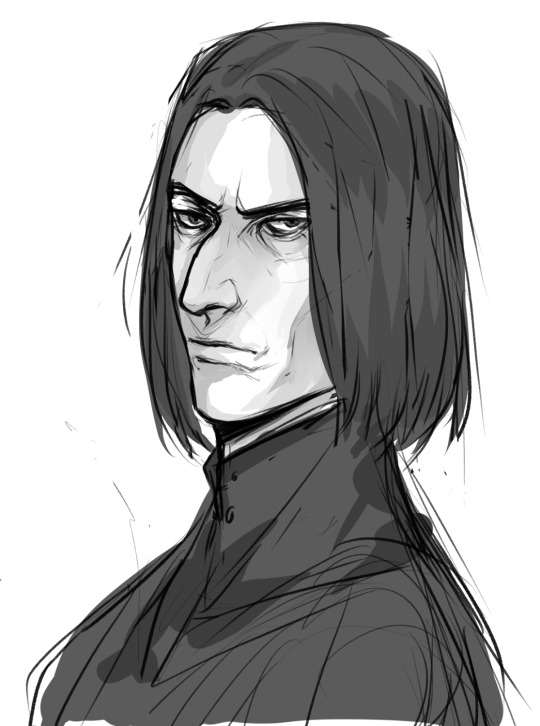
Quick warm up before a commission. It's been a minute since I last drew him :)
445 notes
·
View notes
Note
wait how bougie was Tom Riddle Sr.? How nice would his Manor have been? Was he like an actually Lord with a title and stuff?
thank you very much for the ask, anon!
in half-blood prince, dumbledore refers to tom riddle sr. as "the squire's son" - which allows us to state with certainty that he was a minor aristocrat.
however, the word minor is important here.
there are - historically - two levels of aristocracy in britain. the first are the peers of the realm - which refers to families which hold one or more of the titles of duke, marquess, earl, or viscount. these are the elite of the elite - these gradations of nobility were created in the middle ages as a way of distinguishing those who held the titles from other noblemen, usually because of a close relationship [often one of blood or marriage or both] to the king.
the titles are hereditary by male primogeniture, and the holders - while this is no longer the case - used to have political power [such as the right to sit in the house of lords], simply by virtue of their birth.
[this is why they're called "peers" - it refers to them historically being close in status to royalty, and therefore expected to serve as royal advisors.]
there is another class of peer - a baronet - whose title is similarly hereditary, but whose position doesn't come historically with the right to sit in the lords or advise the king by virtue of birth. [baronets may - of course - have been members of parliament, or royal advisors selected at the king's discretion, but this would be separate from their title. a duke, in contrast, could historically expect to request a meeting with the king simply because he was a duke.]
while some families have historically been ennobled at the king's discretion, access to any of these titles is pretty much restricted to the small group of families who've held them for centuries.
but below the peers of the realm, there is a second, more minor class of aristocracy, the landed gentry - of which a village squire is a textbook example.
historically, what is meant by "landed" is an ability to live off of the rental income of one's country holdings, which would be leased to tenant farmers. that is, they are landlords in the original sense of the term - lords of the land. this is what tom sr. tells us his family does in half-blood prince:
“It’s not ours,” said a young man’s voice. “Everything on the other side of the valley belongs to us, but that cottage belongs to an old tramp called Gaunt, and his children. The son’s quite mad, you should hear some of the stories they tell in the village - ”
what is also meant by "landed" is that the family in question is of the upper-classes, but that they are still "commoners" - which in this context doesn't imply a value judgement, but which is a socio-legal term which simply indicates that they don't hold an aristocratic title such as duke, earl etc.
[and gentry families certainly aren't common in terms of financial standing... the most famous member of this class in literature? fitzwilliam darcy, whose ten thousand a year is something like thirteen million quid in today's money...]
gentry families might be very old - they might have received their lands from the king in the middle ages as a reward for knightly service, and it's interesting to imagine generations of gaunts and riddles brought up alongside each other in little hangleton - or they might be comparatively newer - tom sr.'s great-grandfather [feasibly born c.1810] could have been a self-made victorian industrialist who bought the lands from the original holder and established himself as gentry.
by 1900, it was becoming much harder for the gentry to live on rental income alone, and many would also have had jobs. these would have been elite, and very frequently were in politics, the civil service, the military, or the law. tom sr's father - whom the films call thomas, so let's go with that - might, for example, have served as a high-ranking officer in the army [including during the first world war], be the local magistrate, or be the local member of parliament.
in terms of titles, thomas riddle would almost undoubtedly be sir thomas - and this is how it would be correct to address him. but this title would be a courtesy, and it wouldn't be hereditary unless the riddles were also baronets [which it's entirely plausible that they were].
which is to say, tom sr. would not have a title while his father was alive - although he would have the right to be referred to formally in writing as mr thomas riddle esq. [esquire]. the correct form of verbal address for anyone other than friends and family would be to call him mr riddle, although the riddles' servants would probably refer to him as mister tom.
tom jr. would not have a title while his father or grandfather was alive. if the riddles were baronets, he would technically inherit the title after he kills the rest of the male line... but given that tom sr. never acknowledged him and his existence was presumably unknown to the riddles' lawyers this wouldn't be something which happened in reality. the estate's executors clearly took control of the riddles' property, the land was portioned off and sold, and the house became a standalone property for sale.
the riddle house - which is a name used informally for it in little hangleton, it would have a different "proper" name - is described in canon in ways which show that it's a typical manor house, which means it would look something like this:
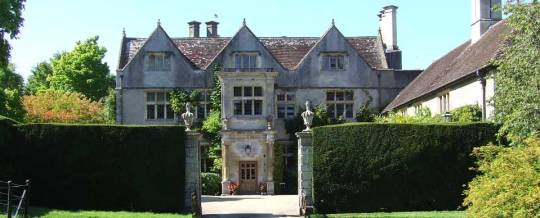
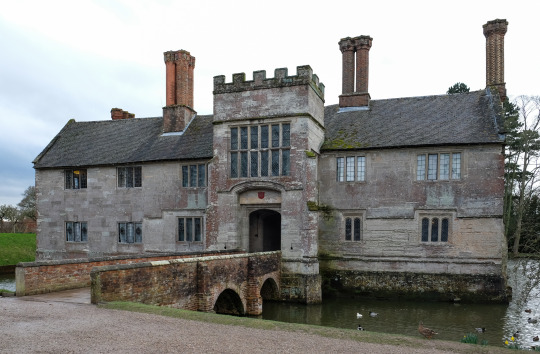
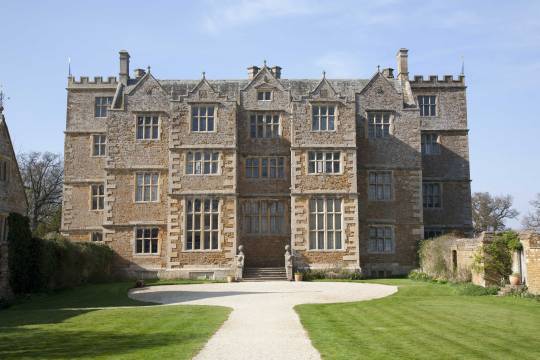
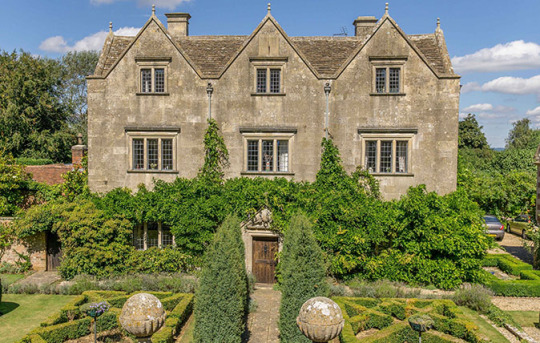
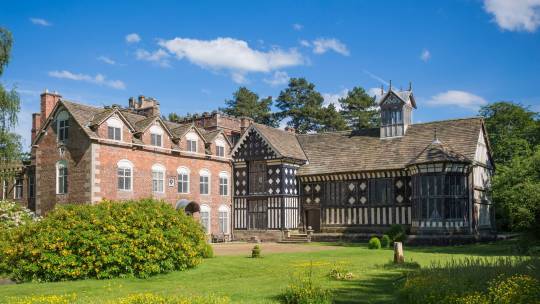
these houses are obviously very impressive, but they're tiny in size in comparison to the magnificent stately homes - places like blenheim palace, chatsworth, burghley house, holkham hall - lived in by the titled aristocracy. the riddles would entertain - for example - by giving house parties, dinner parties, hunting parties, etc., but they wouldn't have a ballroom or a dining hall capable of seating hundreds.
[they would probably also own a property - probably a flat or small house - in london.]
they would have servants, but not colossal numbers - they would undoubtedly have a butler but not footmen, and the upstairs maids would report to the butler since they probably wouldn't have a housekeeper. they canonically have a cook, who probably had one or two kitchen maids assisting, and they canonically have a gardener - frank bryce - who probably doesn't have any assistants. they may, depending on the size of the estate, have a gamekeeper. sir thomas undoubtedly had a secretary and a chauffeur, and his wife might have a lady's maid. tom sr. would have had a nanny and then been educated until at least the age of eight by a governess, but would then have attended a prep school [either day or boarding] until the age of thirteen, and then gone to a boarding school, from which he likely went on [on the basis of social class rather than talent] to oxford or cambridge.
the family would have enormous social influence locally. most people - and also businesses - in little hangleton would be their tenants, and they would also probably have a say over the appointment of the local clergyman [an important figure in the community in the nineteenth and early twentieth centuries], since the parish church is likely to have been something called a "living" - the thing which turns up again and again in jane austen - which means that the church and its parsonage technically belongs to the landowner, but is granted to the vicar as a freehold while he's in post.
gossip about the riddles' doings would also be the main source of local interest - the servants were dining out for months on tom sr.'s elopement and return.
so they're something resembling celebrities - but they're local celebrities. nobody in london - and even nobody in cities we can imagine are nearer to little hangleton, such as liverpool - would particularly know or care who they were. tom sr. might have made it into the london gossip columns if he was part of a particularly scandalous "set" [a group of friends] who socialised in the capital, but these mentions would have been fleeting - and the press would have been much more concerned by the doings of members of his set who were genuinely titled or who were legitimately famous.
[this is the reason why mrs cole doesn't recognise the name. if merope had said her son was to be named cecil beaton after his father, she may well have been prompted to hunt him down...]
so tom sr. is elite - but he's elite in a way which is extremely culturally-specific, and which is [just like the portrayal of aristocracy in the wizarding world - the blacks, for example, are far less aristocratic than the riddles in terms of canonical vibe] often exaggerated into the sort of pseudo-royal grand aristocracy which the british period-drama-industrial-complex makes such a big deal of.
and tom jr.'s character is affected by this in a series of extremely interesting ways.
by which i mean that, in terms of blood, he's probably the most aristocratic character in the series - the absence of grand aristocracy in the wizarding world would mean that [were he raised by his father] he would come from a social background which was equivalent [even as it was divided from them by virtue of being muggle] to any of his fellow slytherins, and would help him easily blend into their society because the manners, genre of socio-cultural reference points [he would recognise, for example, that quidditch heavily resembles both rugby and polo], accent and way of speaking etc. that he would possess would be broadly indistinguishable from those of his pureblood peers.
[this is why justin finch-fletchley and draco malfoy speak in essentially the same way.]
but he would then be given the enormous boost in cachet - one which would genuinely elevate him above the rest of his cohort - of his maternal line.
and we see in canon that this does bestow some privilege on him among his peers while he's in school:
Tom Riddle merely smiled as the others laughed again. Harry noticed that he was by no means the eldest of the group of boys, but that they all seemed to look to him as their leader.
“I don’t know that politics would suit me, sir,” he said when the laughter had died away. “I don’t have the right kind of background, for one thing.”
A couple of the boys around him smirked at each other. Harry was sure they were enjoying a private joke, undoubtedly about what they knew, or suspected, regarding their gang leader’s famous ancestor.
where he's let down socially is that people like slughorn - to whom he can't reveal his slytherin ancestry and hope to maintain cover for his wrongdoing - don't think he's come from anywhere particularly special. this is because he has a muggle father - absolutely - but it's even more that he has a muggle father who, since he left him to be raised in an orphanage, was presumably working-class.
what the young voldemort lacks is any socio-cultural familiarity with the muggle class performance which the class performance of the wizarding world parallels. abraxas malfoy boasting about how important his father is would be something a tom jr. raised by the riddles could match - "oh yes, my father gives to all sorts of causes too. in fact, he was invited to buckingham palace because of it." - establishing himself as an equal in terms of class and social influence even if he isn't an equal in blood.
what actually happens in canon is that the orphaned tom - with his uncouth manners and his working-class accent - has no hope of gaining any sort of social equality with his posh peers.
so he becomes determined to outrank - and humiliate and control - them.
#asks answered#asenora meta#tom riddle sr#tom riddle#lord voldemort#surprise! it's the class system!
70 notes
·
View notes
Note
There is tomarry, but how about Voldemort and the boy who was almost chosen, Neville?
i am genuinely shrieking!
thank you very much, anon - i'm massively compelled by this and i thank you for enabling it...
something which preoccupies me far more than it should [what a sad little life, jane] is whether voldemort ever actually knows that neville is in contention to be the child the prophecy is referring to. the way dumbledore puts it in order of the phoenix makes it sound like he did - and that harry was chosen after a weighing up of whatever evidence you might weigh up before deciding to murder a child - but in deathly hallows voldemort's general vibe when meeting neville is very much giving "i am entirely pretending to know why i supposedly recognise this man"...
which means we have to ask ourselves... what's the hook? it makes perfect sense to want to nail your fated enemy. it's a bit harder to justify why you want to nail some guy - especially given all the trouble it would cause in your three-decade-long situationship with the woman who tortured his parents into incapacity.
and yet.
voldemort gasses neville up as brave and spirited at the end of deathly hallows, tries to engineer an excuse to see him again by inviting him to become a death eater, and then takes being rejected by him exceptionally poorly. that says interested to me!
[the interest passes pretty quickly when neville reveals himself to be far more brutal at dealing with voldemort's snake than he'd like. call him old-fashioned, but he misses the era of romance when men didn't just wave their swords around and hope they hit something.]
#asks answered#asenora's opinions on ships#unhinged and deranged ships#nevillemort nation assemble#neville longbottom#tom riddle#lord voldemort
18 notes
·
View notes
Note
I LOVE YOUR SHIPPING THOUGHTS OMG THEY ARE SO INTERESTING.
thank you very much, anon! i hope you have a wonderful day.
3 notes
·
View notes
Text

two guys huggin
787 notes
·
View notes
Text
a little reblog of this for its anniversary!
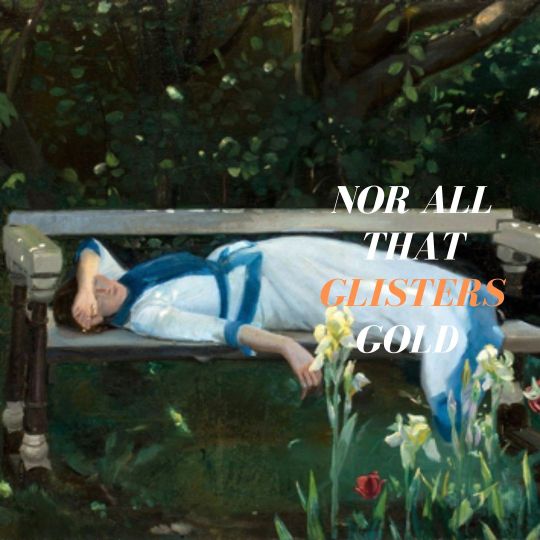
nor all that glisters gold
sirius black & bellatrix lestrange
teen | 8.8k words
an understanding dawns between them. despite their age gap, they recognise in each other a shared capacity for cruelty. they know their blood runs with a shared desire to see other people get hurt, a shared need for pain.
he treasures it.
when he was a child, sirius wanted nothing more than to follow in the footsteps of his favourite cousin. this desire will not last.
this piece was written for @womenofthehouseofblack fest [you can find the other fics in the collection here].
author's notes below the cut

sirius and bellatrix’s relationship is an area of canon which i find fascinating. the two are set up in the narrative as being extremely similar - right down to the fact that they both die laughing - in personality [and, of course, in appearance - the description of sirius in this fic as having brown eyes comes from a desire to emphasise that physical similarity; i know that jkr has said he has grey eyes, i’m just ignoring her…].
above all, both of them have two incredibly contradictory aspects to their personalities: they can be incredibly cruel; and they are astonishingly loyal.
and in this, bellatrix serves to emphasise something which i think is the standout aspect of sirius’ role in the harry potter series - what he says about the value of choice. i’ve written about this in more detail in the notes for lux aurumque, a sirius-focused one-shot i published recently, but the summary is that i am very uncomfortable with portrayals of sirius which undermine the significance of choice - and, in particular, the choice to defy your family in an extremely lineage-based society - in order to suggest that he feels more comfortable within the world of his birth than with james and the life he chooses to make for himself. lux aurumque deals with several of the choices referred to in this piece - particularly the idea that sirius asks the sorting hat to place him in gryffindor - in more detail.
it was important to me in nor all that glisters gold to draw out the idea that sirius’ discomfort with his social class starts early. he dislikes the pureblood friends his mother wants him to make, and the boring activities he is supposed to do to demonstrate his class background. he loves his cousins - his closest childhood companions - but when faced with the reality of what they are becoming as the first war rears its head, he knows what he has to do.
because bellatrix, of course, makes a different choice.
nor all that glisters gold is an examination of something which i am certain must have been a key aspect of bellatrix’s radicalisation, but which is absent from a lot of analysis about her: that she is someone who, from childhood, wishes to escape the gendered expectations of her social class. here, as in the three sisters [author’s notes here], another piece i’ve written for this fest, she talks about wanting to be a warrior like other girls talk about wanting to be a wife; and loathes the ephemera of girl-hood like dolls and tea-parties. in this, she is very much in contrast to narcissa, whose conformity to the expectations of her gender is explored in my narcissa-centric piece other women and of purer blood [author’s notes here].
one of the key gendered expectations that bellatrix chafes against is, obviously, marriage. [which is also something clearly rejected by sirius as well.]
that purebloods practise arranged marriage is implied by canon - sirius’ statement in order of the phoenix that pureblood parents who wish their children to marry other purebloods take an interest in choosing from the pool of eligible candidates tells us that - and wizards regardless of blood-status seem to marry far earlier than muggles [james and lily marry at nineteen, for example, and we can identify multiple other women in the series who seem to be married when they are between the ages of 18 and 21].
[an important aside, of course, is that arranged marriages and forced marriages are not the same thing. arranged marriage is practised all over the world, and many arranged marriages are complete and loving successes. lucius and narcissa were very probably an arranged marriage; they also obviously adore each other. bellatrix’s issue is not that she objects to this particular way of bringing about a marriage, but that she doesn’t want to be married full stop.]
because there’s nothing wrong with rodolphus - they get along well enough, and he isn’t cruel or abusive - they just don’t click as husband-and-wife. and this only serves to increase her feeling of being trapped in a gendered cage which she wants to escape.
and we all know who helps her with that…
several commenters have noted that the characterisation of bellatrix in this piece as quite naive - and also as acting young for her age and being rather girly - is quite an unusual one. partially, i like this portrayal of her because the harry potter series has such a tendency to assign femininity to wives and mothers [such as narcissa], and to suggest that women who aren’t those things are in some way unfeminine, but i also think that reading her like this - and the hints of it are there in her behaviour in canon; the desperate way she talks to voldemort in the dark lord ascending, blushing when he looks at her, is one of them - provides an interesting insight into her radicalisation.
because all the implication of canon is that bellatrix becomes a death eater when she’s very young [meaning that the same naivety about what that means that we see with regulus and draco can also be meaningfully attributed to her], which means that - whether or not you believe her relationship with voldemort is sexual [I do] - she is being groomed when she’s barely out of school by a man who is in his late forties. indeed, in nor all that glisters gold, i stick to my long-standing headcanon that their sexual relationship starts when she’s only seventeen, and that voldemort is the first person she ever sleeps with.
and, in this, we can see the complexity of bellatrix’s radicalisation - because voldemort clearly has an enormous amount of power over her [as sirius notes, he dictates how she dresses and she begins to parrot his beliefs; she gets engaged and married, essentially, at his command - probably because he wants something from her father-in-law], but she also wholeheartedly believes in his causes. she is a blood-supremacist, and would be with or without him. she is capable of great and ruthless violence before she meets him - indeed, this is the reason voldemort bothers to groom her in the first place.
and voldemort also offers her a chance to escape the gendered confines in which she lives. with his objection to early marriage ages and loveless unions, he’s a bit of a girlboss in this, which might seem out of character; but i do think it’s justifiable on the basis of his canon portrayal that he’s someone who has no real interest in the maintenance of traditional social structures [what he does like, here and in other women and of purer blood is the idea that he has the right to dictate the social order, and to be heavily involved in his followers’ lives]. after all, he himself exists outside of the class structures which define the wizarding world, and he clearly rejects the expectation that this should be something he aspires to [he refuses slughorn’s job offers entirely because he wants a job he got himself, for example]. he’s also someone whose physical description - especially the way he speaks and moves - implies a certain degree of effeminacy, and i am incredibly convinced by the idea that he can be read as trans or genderqueer.
which is to say that i have always had the headcanon that bellatrix falls so heavily for him because he is one of the few men she knows who is willing to support her desire to live a life of her own making, outside the social expectations placed upon her.
and this, i think, is one of the things that the sirius of this piece is not entirely able to understand - after all, he frees himself from the world which constrains him.
sirius’ jealousy of voldemort is something which has stood out to multiple commenters, and i think this is partially triggered by the fact that he himself retains more gendered influences than he may believe. i’m always struck in canon, for example, about the way he talks about the duty barty crouch sr. should have had towards his family - and while i don’t think that this would make him the character i’ve criticised above, who thinks his family is more important than his choice, this expectation drives his anger in nor all that glisters gold at how bellatrix and narcissa don’t stick by andromeda.
[on whom: i often find that andromeda is written as being quite stuck-up, as though all of tonks’ vibrant canon personality comes from ted. that she is exactly like her daughter in this piece was important to me.]
because this piece is, of course, also about the black family more generally. in particular, it builds on a theme in lamentation [author’s notes here], another piece i’ve written for this fest, that walburga suffers from postnatal depression. the fairies and changeling imagery appears across both of these pieces - as the images of elder trees, also associated with fairies and widely considered to be unlucky, do across this and the three sisters. regulus is a minor character, but he does appear as an example of something which i think must have contributed to the canonical tension readable between sirius and dumbledore - that sirius knows who voldemort is probably recruiting, and how, but sees that dumbledore appears to be doing nothing to stop it.
[finally, i can never give up the headcanon that sirius has an aspen wand. they are protective trees, often planted near houses for safe-keeping, and the connection between this and the role of secret keeper…? stunning.]

20 notes
·
View notes
Note
every time you write ship meta it makes my day and either makes me laugh or makes me think or somehow both sometimes. for your unusual ships thing: Tom riddle sr/morfin gaunt & Tom Riddle Sr. / Bellatrix Lestrange (assuming he was somehow still alive by her time)
thank you very much - both for the ask and for the very kind message - anon!
morfin gaunt/tom riddle sr.
answered here.
bellatrix lestrange/tom riddle sr.
yes. hugely compelled.
for the semi-serious point that - as i've said here - i really like the idea that all of lord voldemort's most voldemort-ish characteristics come via his father, as a way of underscoring that tom sr.'s entire narrative purpose is to show how his son can't outrun his muggle heritage. and why shouldn't a weakness for dark-haired, imperious women also be one of those shared traits?
and while the concept of getting into the funky way with a muggle ought to go against all her principles, i don't imagine it would be too hard for bellatrix to be won over by the fact that tom sr. is:
a) rich
b) canonically horrible and disliked by everyone he meets [just like her! it's giving compatibility!]
c) a horse girl - and therefore presumably equipped with a great arse
d) canonically hot, even as a young man - which means we can only assume he'd have evolved into a top-tier dilf
i think that tom jr. would be forced into becoming amenable to it because of his obvious oedipus complex. you just know bellatrix would insist on being addressed as "mummy"...
9 notes
·
View notes